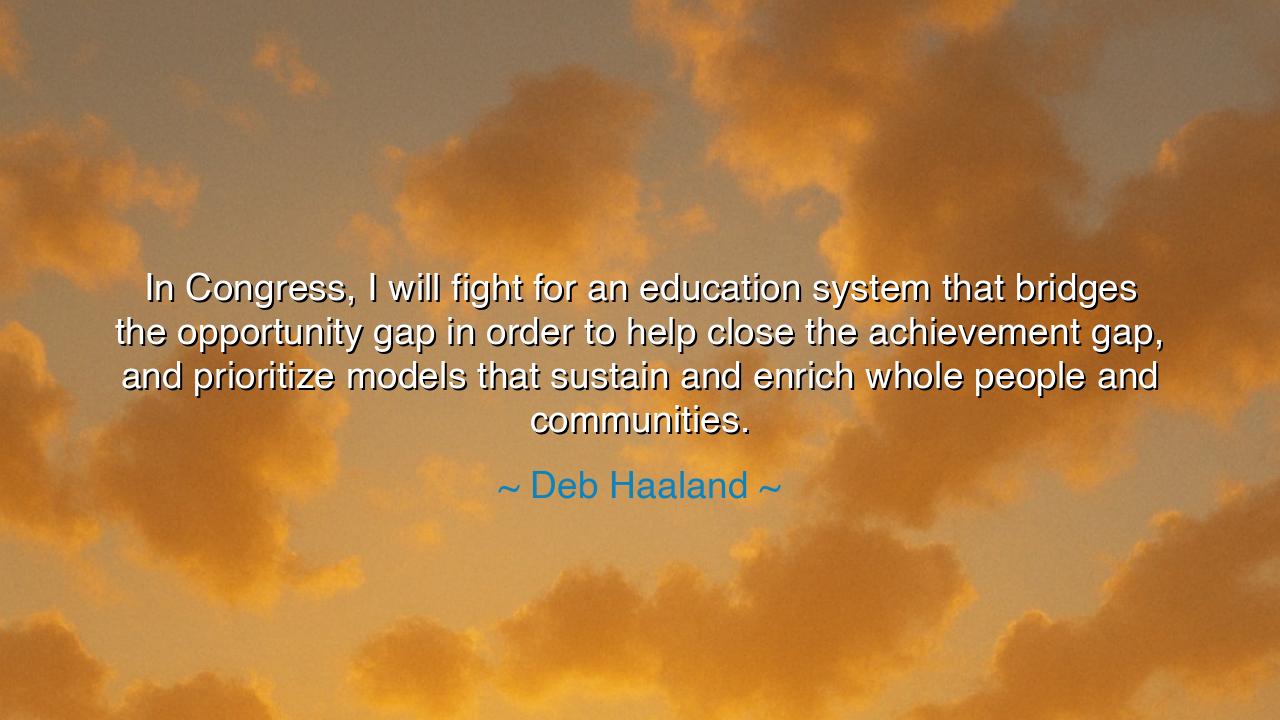
In Congress, I will fight for an education system that bridges
In Congress, I will fight for an education system that bridges the opportunity gap in order to help close the achievement gap, and prioritize models that sustain and enrich whole people and communities.






"In Congress, I will fight for an education system that bridges the opportunity gap in order to help close the achievement gap, and prioritize models that sustain and enrich whole people and communities." Thus spoke Deb Haaland, one of the first Native American women to serve in the United States Congress, a leader whose life itself is testimony to resilience, heritage, and hope. Her words resound like a clarion call, reminding us that education is not merely the learning of facts, but the shaping of destiny—both for individuals and for entire communities.
The meaning of her declaration is profound. She speaks of the opportunity gap—the unequal access to resources, teachers, safe schools, and nourishing environments that often divides the wealthy from the poor, the privileged from the marginalized. From this inequality springs the achievement gap, where some children soar to success while others struggle against invisible chains. Haaland’s vision is that by bridging opportunities—giving every child equal tools, equal guidance, equal nourishment—we may close the rift in achievement, and thus allow all to rise together.
History gives us examples of this truth. Consider the GI Bill after World War II, which gave veterans—many from working-class families—access to college education. With opportunity in hand, millions achieved what had once seemed impossible: degrees, careers, and a thriving middle class. Here we see the eternal law: when opportunity is widened, achievement multiplies. Conversely, when opportunity is withheld, whole generations are condemned to struggle, no matter their talent or will.
Haaland’s words also carry the wisdom of her people, for she speaks not only of closing gaps but of enriching whole people and communities. True education is not merely about producing workers for industry, but about shaping citizens, neighbors, leaders, and dreamers. It is about sustaining cultures, strengthening families, and weaving together communities. This echoes the ancient belief that learning is not only for the mind, but for the heart and spirit. To feed the intellect while starving the soul is to raise hollow men; to enrich both is to raise whole people.
We see this truth in the story of Booker T. Washington, who founded Tuskegee Institute not only to teach skills but to build pride, dignity, and community among freed slaves and their descendants. He knew that education was not only about individual achievement, but about lifting entire peoples from despair into hope. His schools were not merely factories of knowledge, but sanctuaries of self-respect and empowerment. Haaland’s vision stands in this same lineage: education as a force that transforms not only individuals, but whole communities.
The lesson for us is clear. If we wish to heal divisions, if we wish to see justice flourish, we must invest not only in schools, but in equity, opportunity, and the nurturing of the whole child. Every classroom must be more than a room of desks; it must be a gateway of hope. Every teacher must be more than an instructor; they must be a cultivator of human potential. And every society must see education not as an expense, but as the greatest investment in its own survival and greatness.
Practical action follows. Parents, advocate for fair resources in your schools. Teachers, see your students not as test scores, but as whole beings—mind, body, and spirit. Leaders, shape policies that close the opportunity gap—through scholarships, mentorships, nutrition, healthcare, and safe housing. And every citizen, rich or poor, must remember: the strength of a nation lies not in how high its privileged few can climb, but in how far its many can rise together.
So I say to you, children of tomorrow: remember the wisdom of Deb Haaland. Fight not for a system that favors the few, but for one that bridges gaps, uplifts the weary, and enriches communities. For when every child, regardless of birthplace or background, is given the chance to learn and thrive, then the whole nation ascends. This is the true power of education: not the advancement of some, but the flourishing of all.






AAdministratorAdministrator
Welcome, honored guests. Please leave a comment, we will respond soon